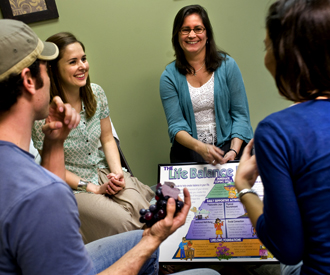Mind Over Medicine
Dr. Nereida A. Parada, a clinical associate professor of medicine at the Tulane School of Medicine, believes in taking a holistic approach to wellness by promoting techniques such as meditation and movement as a means to good health.

Dr. Nereida A. Parada, center, a physician who is board-certified in four fields of medicine, is studying mind-body medicine and teaching a holistic approach to wellness to medical students. (Photo by Paula Burch-Celentano)
While there will always be a role for medication, self-care techniques for managing ailments are powerful and less expensive preventive tools, says Parada, who is in the section of pulmonary diseases, critical care and environmental medicine.
"This has been the most enlightening aspect of my training as a physician," says Parada about studying for certification as a mind-body medicine practitioner. "This is really that good; I want to reach out and let people know that this is something to think about."
Mind-body techniques to increase relaxation and relieve stress include meditation, yoga, creative and artistic expression, integrative nutrition, exercise and breath work.
Through her medical school classes and participation with student groups, she realized that medical students were interested in learning more about this way of promoting wellness. It is standard practice to teach medical students to respond to illnesses such as high blood pressure with medication, she says, but more doctors should be taught to help patients relieve stress that could be a contributing factor.
As part of a six-person team of healthcare professionals, Parada helped develop the new Mind-Body Center of Louisiana, a nonprofit organization that plans to hold workshops about anxiety, depression, psychological trauma and well-being.
An opening celebration for the new center that is free and open to the public is on Friday (Oct. 16) from 7â“9 p.m. in the J. Bennett Johnston Health and Environmental Research Building at 1324 Tulane Ave. Guest speaker will be Dr. James Gordon, founder and director of the Center for Mind-Body Medicine in Washington, D.C., and a renowned expert in using mind-body medicine to heal depression, anxiety and psychological trauma.
